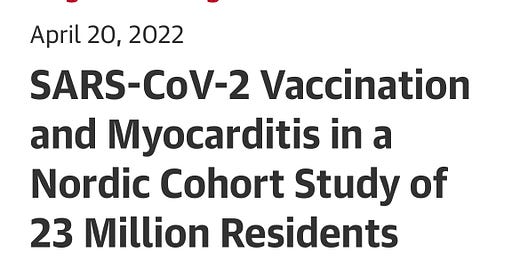The dose makes the poison
A major new study adds more evidence that Moderna's high-dose mRNA shots are more dangerous than Pfizer's smaller jabs; will public health bureaucrats acknowledge reality as they push more boosters?
A huge new study shows mRNA shots sharply raised the risk of dangerous heart damage in Scandinavians who received them last year, and that Moderna’s 100-microgram shot was significantly more dangerous than Pfizer’s 30-microgram dose.
For young men, who are at particularly high risk of post-jab heart inflammation, the gap was especially significant.
Data from the study, published in a peer-reviewed journal called JAMA Cardiology, show that giving 1 million men aged 16-24 two doses of Moderna’s vaccine would lead to almost 300 hospitalizations for myocarditis and a related illness called pericarditis. Most would come after the second dose. Using Pfizer’s shot instead would lead to about 100 hospitalizations.
An appendix in the paper also showed a trend towards deadlier outcomes in myocarditis patients who had received Moderna’s shot as opposed to Pfizer’s jab or no vaccination, though the trend was not statistically significant.
Almost 5 percent of people who were hospitalized for myocarditis after receiving Moderna’s shot died, compared to under 1 percent who received Pfizer’s shot or were unvaccinated. (SEE ETABLE 11)
Sweden, Norway, and Finland halted the use of the Moderna shots in people under 30 last October. The United States has no similar restrictions, though regulators have so far refused to approve Moderna’s jab for people under 18.
The higher risk of Moderna’s shots found in the paper add to growing evidence that the dangers of mRNA rise with dosing. Moderna scientists themselves acknowledged the potential problem in a paper the company posted last month.
In turn, that evidence raises the question of whether pushing people to take additional “booster” doses to shore up the vaccines’ failing protection may bring new risks. Because so few clinical or safety studies have been conducted on boosters, at this point regulators and scientists are essentially guessing about the dangers of repeated dosing.
But that lack of knowledge has not stopped a relentless push for the boosters, which temporarily raise antibodies to the coronavirus before their protection again fades.
In the new paper, published Wednesday, researchers drew on exceptionally thorough health and vaccination records from Denmark, Finland, Norway, and Sweden. They examined thousands of myocarditis and pericarditis cases in the four Scandinavian countries from late December 2020 to early October 2021, checking them against vaccination dates.
Myocarditis is an inflammation of the heart muscle itself, while pericarditis results from the inflammation of the sac around the heart. They generally resolve with rest and anti-inflammatory treatment, but in some cases they can lead to permanent heart damage or even be fatal.
—
Support independent journalism:





I heard a doctor say that there is no such thing as mild myocarditis and that once the heart muscle is damaged, it cannot be repaired by the body; it has a 20% fatality after 2 years and a 50% fatality after 5 years. That seems awful serious.
Wouldn't 100 and 300 hospitalizations per million for any other “vaccine” have caused it to be paused?